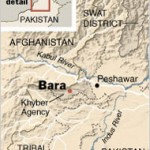Friday
Feb272009
Mr Obama's War: Gareth Porter on the Afghanistan "Mini-Surge"
 Friday, February 27, 2009 at 10:20
Friday, February 27, 2009 at 10:20  Gareth Porter, who is emerging as the best observer of the US military manoeuvres on Iraq and Afghanistan, looks behind President Obama's eventual decision to approve only part of the 30,000 extra troops request by US commanders for the Afghan War (Porter says 17,000 sent; we put the figure at just over 20,000). While the President has apparently drawn the line with the military, Porter warns, "Obama now faces the prospect that the Joint Chiefs will renew their support for McKiernan's request for the remaining 13,000 troops next month." And he has an analogy which is just short of terrifying:
Gareth Porter, who is emerging as the best observer of the US military manoeuvres on Iraq and Afghanistan, looks behind President Obama's eventual decision to approve only part of the 30,000 extra troops request by US commanders for the Afghan War (Porter says 17,000 sent; we put the figure at just over 20,000). While the President has apparently drawn the line with the military, Porter warns, "Obama now faces the prospect that the Joint Chiefs will renew their support for McKiernan's request for the remaining 13,000 troops next month." And he has an analogy which is just short of terrifying:Both Obama's decision to agree to just over half of his field commander's request for additional troops and the broader strategic situation offer striking parallels with the decision by President Lyndon B. Johnson in April 1965 to approve 36,000 out of a 49,000 troop request for Vietnam.
'What is the End Game?': Why Obama Rejected a Bigger Surge in Afghanistan
Gareth Porter
President Barack Obama decided to approve only 17,000 of the 30,000 troops requested by Gen. David McKiernan, the top commander of U.S. and NATO troops in Afghanistan, and Gen. David Petraeus, the CENTCOM commander, after McKiernan was unable to tell him how they would be used, according to a White House source.
But Obama is likely to be pressured by McKiernan and the Joint Chiefs to approve the remaining 13,000 troops requested after the completion of an Afghanistan-Pakistan policy review next month.
Obama's decision to approve just over half the full troop request for Afghanistan recalls a similar decision by President Lyndon B. Johnson to approve only part of the request for U.S. troop deployments in a parallel situation in the Vietnam War in April 1965 at a comparable stage of that war. Johnson reluctantly went along with the request for additional troops within weeks under pressure from both the field commander and the Joint Chiefs of Staff.
The request for 30,000 additional troops, which would bring the U.S. troop level in Afghanistan to more than 60,000, had been approved by the Joint Chiefs of Staff as well as by Defense Secretary Robert Gates before Obama's inauguration. A front-page story in the Washington Post Jan. 13 reported that Obama was ready to "sign off" on the deployment request.
On Jan. 30 Adm. Mike Mullen, the chairman of the Joint Chiefs, said between 20,000 and 30,000 more troops would "probably" be sent to Afghanistan and the figure would "tend toward the higher number of those two."
But on Feb. 9, Mullen indicated that the Pentagon would soon announce that three brigades, or about 16,000 troops, would be deployed to Afghanistan in the coming months.
What had changed in the nine days between those two statements, according to a White House source, was that Obama had called McKiernan directly and asked how he planned to use the 30,000 troops, but got no coherent answer to the question.
It was after that conversation that Obama withdrew his support for the full request.
The unsatisfactory response from McKiernan had been preceded by another military non-answer to an Obama question. At his meeting with Gates and the Joint Chiefs of Staff at the Pentagon Jan. 28, Obama asked the Joint Chiefs, "What is the end game?" in Afghanistan, and was told, "Frankly, we don't have one," according to a Feb. 4 report by NBC News Pentagon correspondent Jim Miklaszewski.
Obama had also learned by early February that earlier assurances from Petraeus of an accord with Kyrygistan on use of the base at Manas had been premature, and that the U.S. ability to supply troops in Afghanistan would be dependent on political accommodations with Russia and Iran.
The rationale from the military leadership for doubling the number of U.S. troops in Afghanistan, even without a strategy or a concept of how the war could end, had been to "buy time" for an effort to build up Afghan security forces, as indicated by Mullen's Jan. 30 remarks.
The 17,000 troops, on the other hand, presented the upper limit of what Obama had pledged to add in Afghanistan during the campaign, according to Lawrence Korb of the Center for American Progress, who was an adviser to Obama.
Korb told IPS that Obama's decision not to wait until the key strategic questions were clarified before sending any more troops was based on the belief that he had to signal both Afghans and Pakistanis that the United States was not getting out of Afghanistan, according to Korb. "There are a lot of people in both countries hedging their bets," said Korb.
McKiernan reminded reporters Wednesday that the 17,000 troops represent only about two-thirds of the number of troops he has requested. That complaint suggested that he had been given no assurance that the remainder of the troops would be approved after the policy review.
The Wall Street Journal quoted an administration official Wednesday as saying that the troop authorization addresses the "urgent near-term security needs on the ground," but "does not prejudge or limit the options of what the [Afghanistan] review may recommend when it's completed."
Obama may have become more wary of getting mired down in an unwinnable war in Afghanistan, despite his strong commitment to increasing troops to Afghanistan during the campaign.
Former national security adviser Zbigniew Brzezinski, on whom Obama has reportedly relied for advice on foreign policy, told Sam Stein of the Huffington Post Wednesday, "We have to decide more precisely what is the objective of our involvement. Because we are increasingly running the risk of getting bogged down both in Afghanistan and in Pakistan in pursuit of objectives which we are lacking the power to reach."
Brezinzski said the administration needed "very specific, narrow objectives".
Korb told IPS that the policy review will deal with political-diplomatic as well as military policy issues, including the option of seeking to incorporate at least elements of the insurgents into the government through negotiations. He recalled that Afghan President Hamid Karzai has been advocating negotiations with the Taliban for two years.
Both Obama's decision to agree to just over half of his field commander's request for additional troops and the broader strategic situation offer striking parallels with the decision by President Lyndon B. Johnson in April 1965 to approve 36,000 out of a 49,000 troop request for Vietnam.
Johnson's decision, like Obama's, was made against a background of rapid deterioration in the security situation, worry that the war would soon be lost if more U.S. troops were not deployed, and an unresolved debate over how the troops would be employed in South Vietnam. Some of Johnson's advisers still favored a strategy of protecting the key population centers, whereas the field commander, Gen. William Westmoreland, was calling for a more aggressive strategy of seeking out enemy forces.
Another parallel between the two situations is high-level concern that too many U.S. troops would provoke anti-U.S. sentiment. That was the primary worry of some of Johnson's advisers about the effect of deploying three divisions in South Vietnam.
Similarly, Gates said Dec. 14 he would be "very concerned" about deploying more than the 30,000 troops requested by McKiernan, because, "At a certain point, we get such a big footprint, we begin to look like an occupier." Gates repeated that point in Congressional testimony Jan. 27, in which he again stressed the failure of the Soviet Union with 120,000 troops.
McKiernan, on the other hand, said Wednesday, "There's always an inclination to relate what we're doing with previous nations," he said, adding, "I think that's a very unhealthy comparison."
Johnson was worried about sliding into an open-ended commitment to a war that could not be won. But two months later he gave in, against his better judgment, to a request from Gen. William Westmoreland, the commander in Vietnam, for "urgent reinforcements". The escalation of the war continued for another two years.
Obama now faces the prospect that the Joint Chiefs will renew their support for McKiernan's request for the remaining 13,000 troops next month. And if the full 30,000 troop increase proves to be insufficient, he is likely to face further requests later on for "urgent reinforcements."
tagged  Barack Obama,
Barack Obama,  Center for American Progress,
Center for American Progress,  David McKiernan,
David McKiernan,  David Petraeus,
David Petraeus,  Gareth Porter,
Gareth Porter,  Huffington Post,
Huffington Post,  Inter Press Service,
Inter Press Service,  Jim Miklaszewski,
Jim Miklaszewski,  Joint Chiefs of Staff,
Joint Chiefs of Staff,  Lawrence Korb,
Lawrence Korb,  Lyndon Johnson,
Lyndon Johnson,  Mike Mullen,
Mike Mullen,  NBC,
NBC,  Robert Gates,
Robert Gates,  Sam Stein,
Sam Stein,  US Military Policy,
US Military Policy,  Vietnam War,
Vietnam War,  Wall Street Journal,
Wall Street Journal,  Washington Post,
Washington Post,  Zbigniew Brzezinski in
Zbigniew Brzezinski in  Afghanistan,
Afghanistan,  US Foreign Policy
US Foreign Policy
 Barack Obama,
Barack Obama,  Center for American Progress,
Center for American Progress,  David McKiernan,
David McKiernan,  David Petraeus,
David Petraeus,  Gareth Porter,
Gareth Porter,  Huffington Post,
Huffington Post,  Inter Press Service,
Inter Press Service,  Jim Miklaszewski,
Jim Miklaszewski,  Joint Chiefs of Staff,
Joint Chiefs of Staff,  Lawrence Korb,
Lawrence Korb,  Lyndon Johnson,
Lyndon Johnson,  Mike Mullen,
Mike Mullen,  NBC,
NBC,  Robert Gates,
Robert Gates,  Sam Stein,
Sam Stein,  US Military Policy,
US Military Policy,  Vietnam War,
Vietnam War,  Wall Street Journal,
Wall Street Journal,  Washington Post,
Washington Post,  Zbigniew Brzezinski in
Zbigniew Brzezinski in  Afghanistan,
Afghanistan,  US Foreign Policy
US Foreign Policy 

 Saturday's New York Times offers confirmation
Saturday's New York Times offers confirmation Evening Update (8.30 p.m. GMT / 1.30 p.m. Washington): Amnesty International and a Tibetan rights group are reported to be "
Evening Update (8.30 p.m. GMT / 1.30 p.m. Washington): Amnesty International and a Tibetan rights group are reported to be " Evening Update (8:30 p.m.): Al Jazeera has a useful summary of the challenge facing the US military "surge", not from the enemy but from its allies. A two-day meeting of NATO defence ministers in Poland is highlighting that
Evening Update (8:30 p.m.): Al Jazeera has a useful summary of the challenge facing the US military "surge", not from the enemy but from its allies. A two-day meeting of NATO defence ministers in Poland is highlighting that